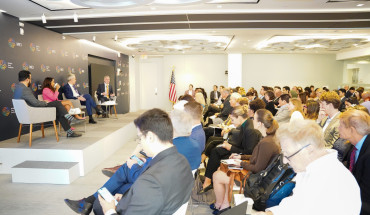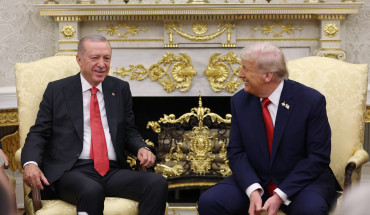On Wednesday, August 10, the Middle East Institute hosted Radwan Ziadeh, Ausama Monajed, Amb. Theodore Kattouf, and Andrew Tabler for a discussion entitled “Syria on the Verge: Implications for a Nation in Revolt.” The event was held at the SEIU building near MEI’s offices, and addressed the policy implications of the continued unrest in Syria.
MEI Vice President Kate Seelye began the event by remarking on the escalation of the Syrian regime’s crackdown on protesters since the start of Ramadan, particularly in Hama and Deir al-Zour. She noted that the international response has been growing in strength, beginning with a “somewhat anemic” statement from the UN Security Council but leading to a condemnation from King Abdullah of Saudi Arabia and a meeting between President Assad and Turkish Prime Minister Erdogan. However, despite the diplomatic response the Syrian response remains largely impervious to outside pressure.
Radwan Ziadeh began his remarks by emphasizing the impact of Ramadan on the protest movement. With the movement’s increasing momentum, Ramadan arrives at the perfect time: now every day can have the force and momentum of a “day of rage,” which usually only gather steam on Fridays. Given that protesters are more numerous than security officers, they now pose a significant threat to the regime’s stability. Meanwhile, the regime continues to respond with collective punishment like that exacted first on Deraa, and later on Hama. But in contrast with the 1980s protests, now the main dissenting groups are comprised tribesmen and youth, not the Muslim Brotherhood. According to Ziadeh, the key objective moving forward is attracting Army support for the protesters.
Ausama Monajed pointed out that many doubt the opposition’s ability to consolidate a governable state. Each city has its own committee and media group, and there are many divergent groups interested in the overthrow of the al-Assad family. However, counter to the expectations of the United States and European Union, the notion of a unified opposition group is simply unrealistic. Rather, the current opposition is truly democratic (albeit fragmented) in nature, and various factions are already debating issues like a future constitution for Syria. Monajed argued that effective Western support would entail connecting the grassroots to existing outside opposition groups. In conclusion, he noted that there is growing support of the revolution from the ruling minority Alawite community, thus delegitimizing the regime’s characterization of the uprising as “sectarian.” Meanwhile a great deal of public scrutiny is falling on Sunni businessmen in Damascus and Aleppo who collaborate with the regime.
Andrew Tabler first reminded the audience that as a result of the uprisings in the 1980s, “everyone stayed home for about fifteen years” having children, resulting in a massive population explosion, and today’s youth bulge and widespread unemployment. It is therefore foolish to claim that the Syrian regime is unconcerned with economics. The issue is that President al-Assad is simply unable to recognize a clear solution. At the same time, the opposition is divided, since it is difficult to coordinate the efforts of seasoned political activists with those of angry youth. Because the opposition is so diffuse, it would be nearly impossible for Assad’s regime to cut the head off the snake. Tabler went on to examine the various interests that international actors have in Syria: the Saudis are heavily influential in oil-rich eastern Syria, while Turkey’s AKP and middle-tier industries are also very interested in Syrian stability. He concluded by reminding the audience that the United States’ primary means of leverage against Syria is that of energy sanctions to cripple the regime without punishing society.
Amb. Theodore Kattouf provided historical context to the conversation, stating that US-Syrian relations have been tenuous since the breakdown of negotiations between Presidents Bill Clinton and Hafez al-Assad in 2000. The Syrian regime survived the George W. Bush administration’s belligerence toward the Ba’athists in Iraq, and became overconfident until the protests movement of the Arab Spring reached its own doorstep. The Obama administration was well-equipped to deal with Assad from early-on, but wrong in thinking that he would be chastened by international pressure; the widespread slaughter of civilians clearly showed that Assad is not ready for reform. Moreover, until very recently the United States lacked the appropriate timing and leverage to confront Assad directly, as did the United Nations.
The question-and-answer session focused largely on the importance of a firm statement from President Obama to encourage and strengthen the democratization efforts by the Syrian people, as well as to diminish support for the regime from security forces, Alawites, and the Sunni business elite. A United States declaration of solidarity would eliminate the Syrian public tendency to imagine a conspiracy between the American and Syrian governments. The rest of the discussion addressed Iran’s interest in preserving the Syrian regime, the impact of a coup on the Arab-Israeli peace process and Lebanese politics, and the limitations of nonviolence among the Syrian resistance.
This event summary was written by Ivan Plis, an intern in MEI's Programs and Communications Department.
Assertions and opinions in this Summary are solely those of the above-mentioned author and do not necessarily reflect the views of the Middle East Institute, which expressly does not take positions on Middle East policy.











